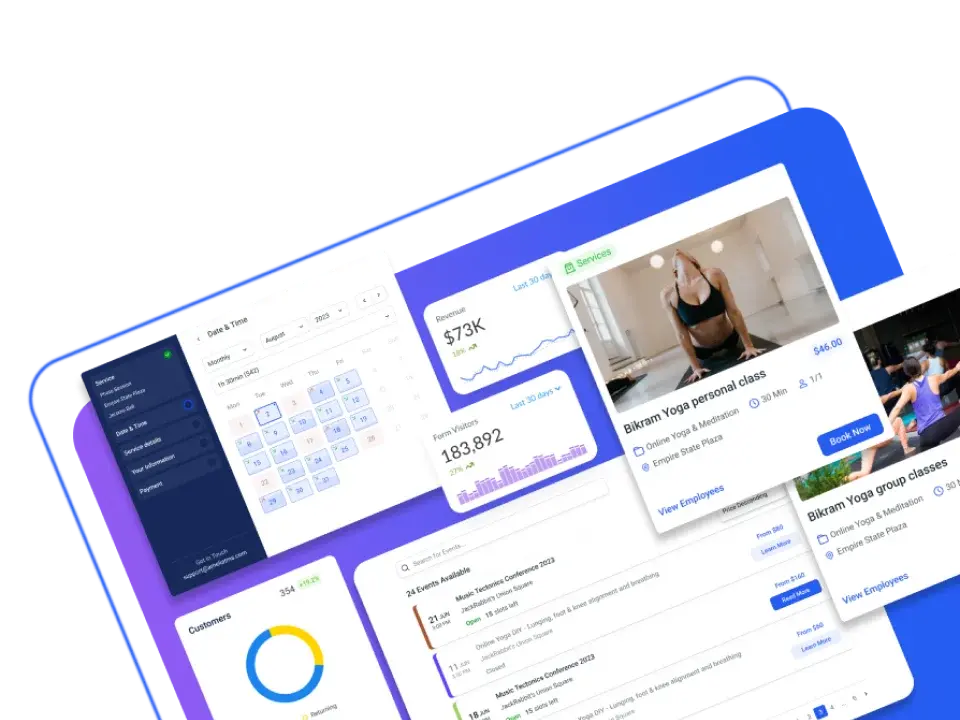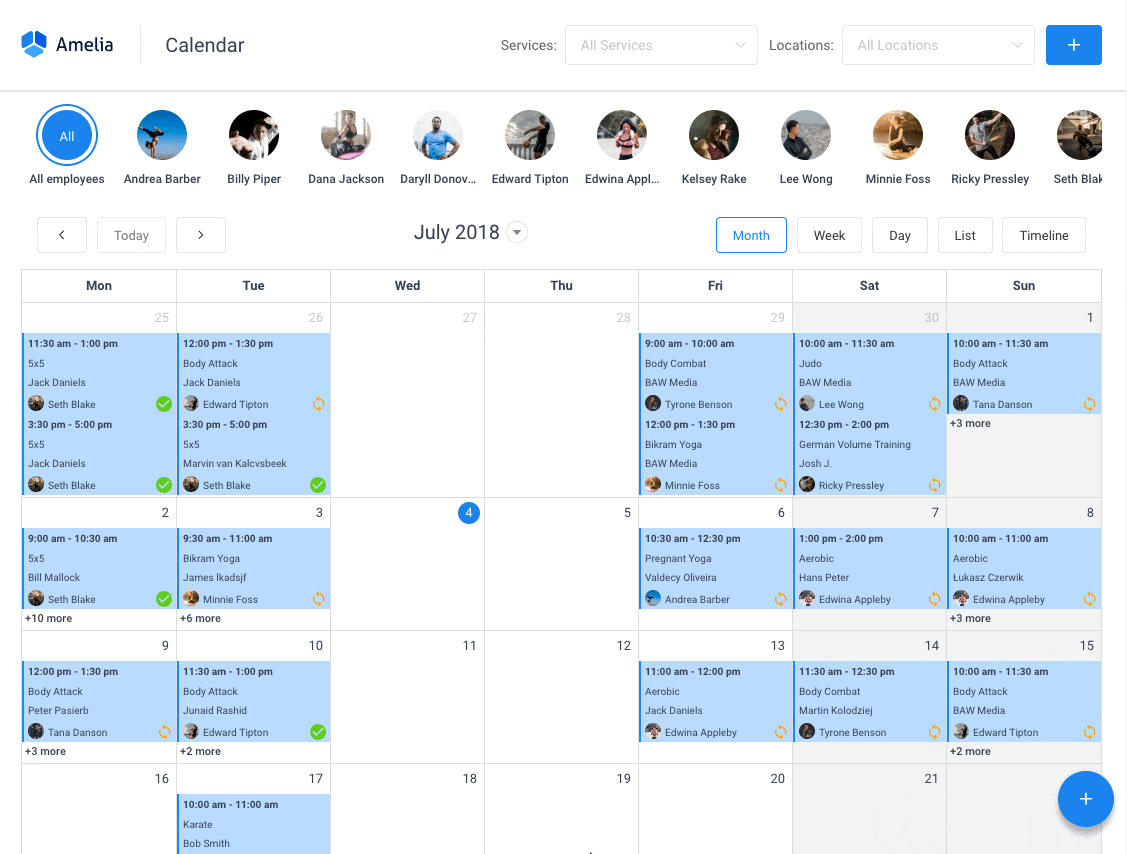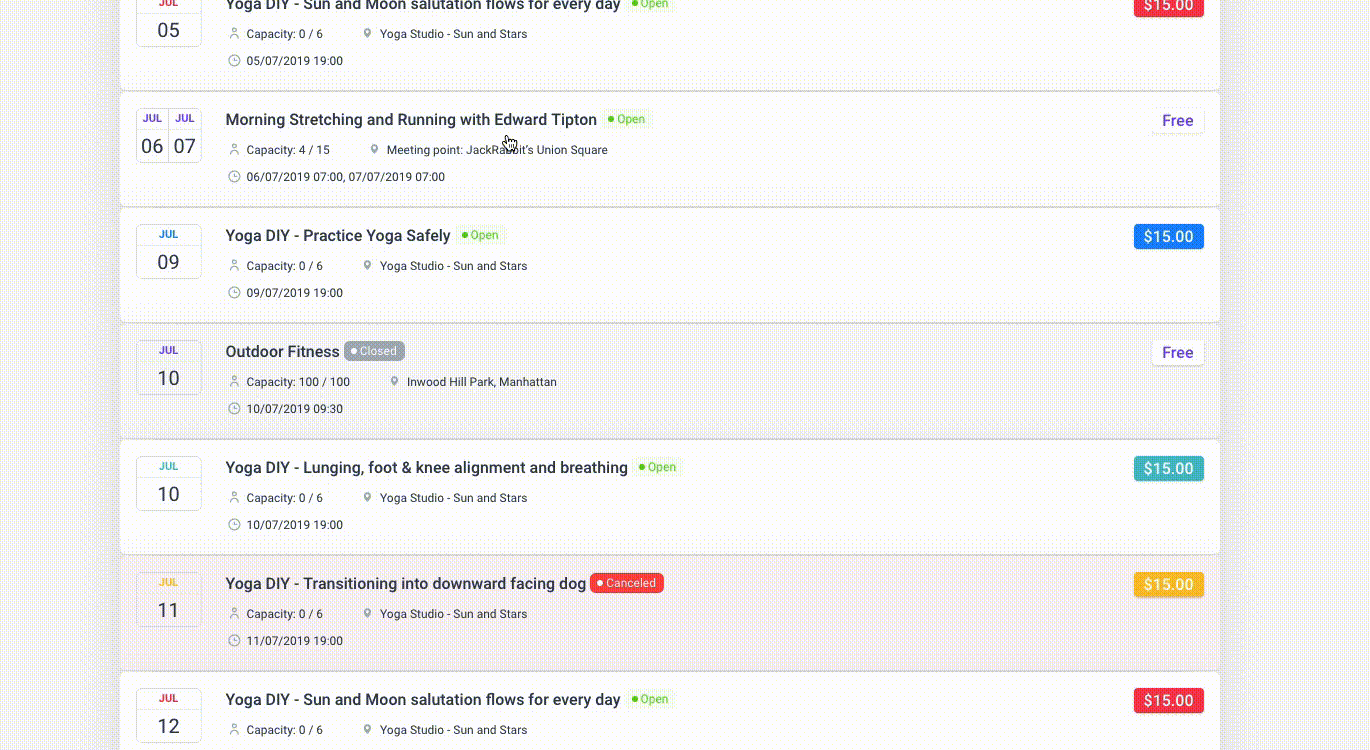Welcome to our comparison of OnceHub (formerly ScheduleOnce) and Calendly – two popular scheduling tools. In this article, we’ll try to settle the OnceHub vs. Calendly debate by taking a closer look at their features, ease of use, integrations, customization options, pricing, and user ratings.
Our goal is to help you choose the right option for your scheduling needs. Whether you’re an individual managing appointments or a business looking for an easy scheduling solution, we’ll break down both OnceHub and Calendly in a simple and unbiased way, so you can decide which scheduling tool works better for you.
Let’s take a look!
OnceHub vs. Calendly: In-Depth Comparison
About Calendly
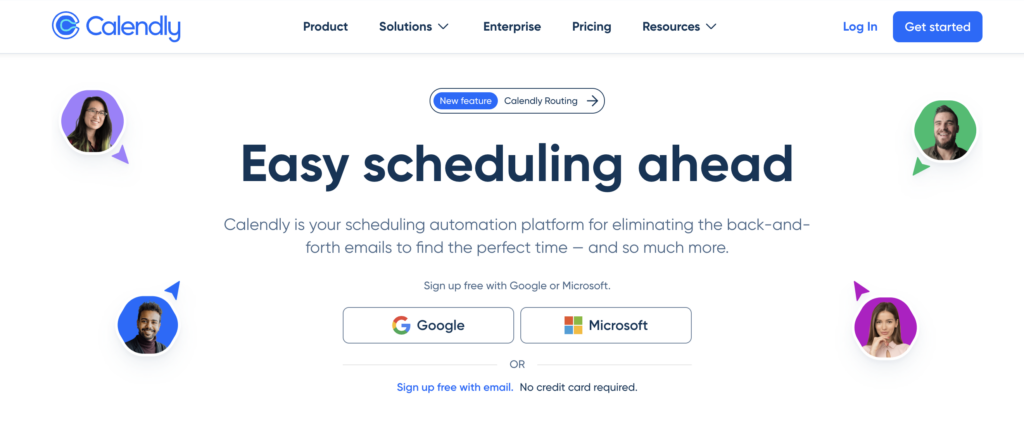
Calendly is a great piece of scheduling software that offers just about anything that a business owner could want. It is very simple to use, and it features some great implementations to speed up your service and boost your sales.
This scheduling tool removes the old ways of booking appointments, such as phone calls and emails, and implements a new and easy modern way of doing things.
Users can log in, plan the calendar, and easily manage their schedules using Calendly.
Calendly is perfect for people who want to use the latest technology for practical purposes. Making appointments is very easy: all you need to do is share your Calendly link, and people will be able to see your whole calendar and make an easy appointment.
Calendly is great for people with busy schedules, as it gets rid of the old way of setting up an appointment and saves time.
You can connect your online calendar with Calendly, which lets the platform see when you are free. Also, you can use it as an alternative to basic calendar apps considering you can integrate it with Google Calendars, iCal, Office 365, and Outlook. You can create various types of business meetings, set the details, and, voila, you are ready for an appointment with a client.
User ratings:
- 4.7/5 on G2
- 4.5/5 on Software Advice
- 4.7/5 on GetApp
Main features
In comparing OnceHub vs. Calendly, we should start with their most notable features. So, let’s take a closer look at what Calendly has to offer:
- Personalized scheduling links: Calendly allows you to create unique scheduling links that you can share with others. These links provide a list of available time slots, and recipients can choose a time that works best for them.
- Time zone detection: The tool automatically detects the time zone of the user and adjusts the available time slots accordingly, preventing scheduling conflicts due to time zone differences.
- Customizable event types: You can set up different types of events with varying durations and settings. This allows you to cater to different appointment types, such as meetings, interviews, consultations, and more.
- Buffer times: Calendly lets you add buffer times between appointments, ensuring you have time for preparation or breaks before the next meeting.
- Team scheduling: If you’re part of a team, Calendly offers features to coordinate and manage group availability, making it easier to schedule team meetings or collaborative sessions.
- Automated reminders: You can set up automatic email notifications and reminders for both you and your invitees, reducing the chances of missed appointments.
- Embedding options: Calendly provides embeddable widgets that you can integrate into your website, making it convenient for visitors to schedule appointments without leaving your site.
- Analytics and reporting: The tool offers insights into your scheduling patterns, showing you which time slots are most popular and helping you optimize your availability.
Ease of use
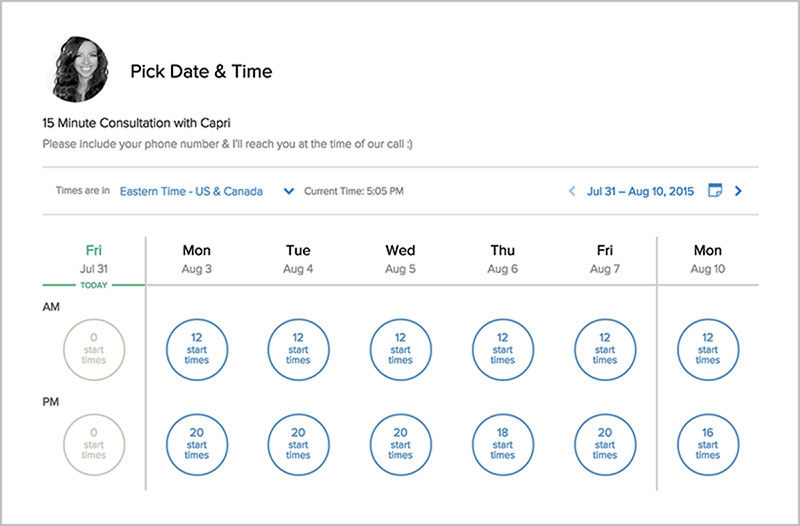
Calendly is known for its user-friendly interface and intuitive design, making it a straightforward tool to navigate and utilize. Here’s how its ease of use contributes to a seamless scheduling experience:
A quick surf through the interface is enough for you to learn the necessary things to start using this software like a pro. All you need beforehand is some basic computer literacy.
Creating an account and setting up your scheduling preferences on Calendly is quick and easy. The platform guides you through the process, ensuring that you can start scheduling appointments in no time.
Moreover, Calendly’s dashboard provides a clear overview of your scheduled events, upcoming appointments, and available time slots. The layout is clean and organized, allowing you to manage your schedule with ease.
What’s more, generating scheduling links and event types is intuitive. The platform walks you through the necessary steps, allowing you to customize appointment details, durations, and availability effortlessly.
Integrations
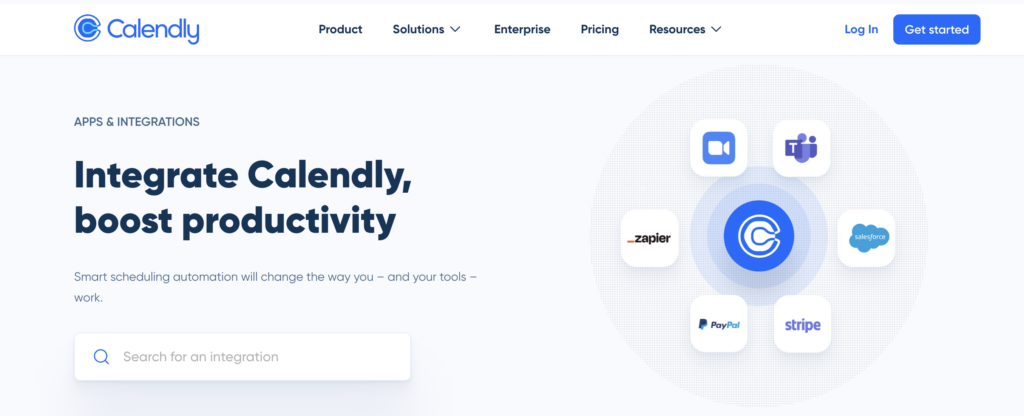
When comparing Calendly vs. OnceHub, and any other scheduling tool for that matter, one of the most important things that Calendly has been going for is its many integrations with other platforms.
Most importantly, you can connect your calendar with a scheduling platform like Google Calendar, Office 365, or iCloud. Some other possible integrations include Jotform, Mailchimp, Salesforce, Zapier, Slack, and Google Analytics. Additionally, you can also integrate automatic meetings with GoToMeeting.
You can also accept payments through PayPal, Stripe, and Stax Payments, which is a useful feature to have if you want to integrate payments into the software.
Customization options
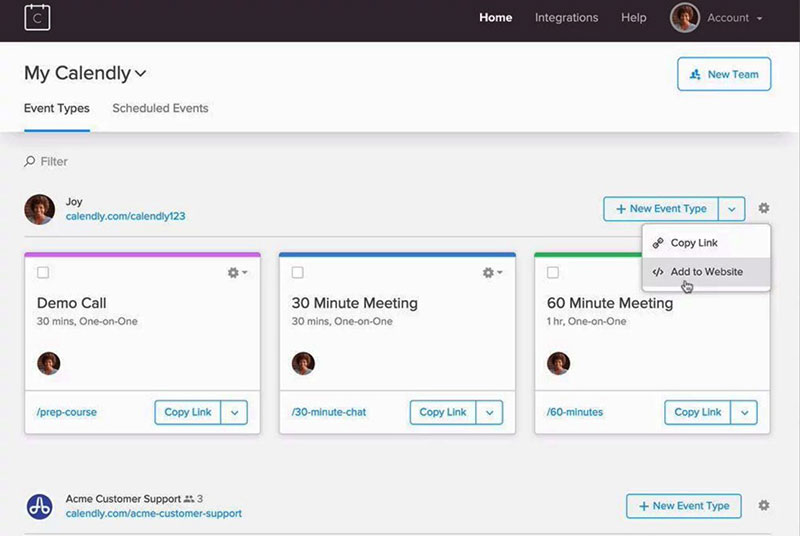
You can easily customize your appointments, schedules, or events, using the “template” section of Calendly, which offers you a whole world of customization options.
You can describe your events, add appointment reminders or notifications, and add more payment methods, among many other features. There is also an “advanced” section of the customization, where there are even more options that allow you to fully customize the experience.
Calendly’s pricing plans
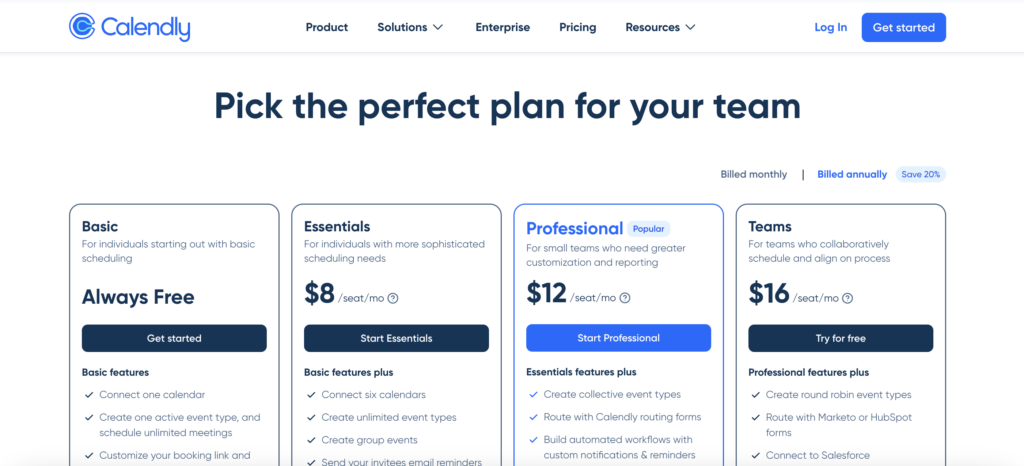
Pricing is often a decisive factor when it comes to software comparison and this OnceHub vs. Calendly debate is no exception.
With Calendly, you get five options: Basic, Essentials, Professional, Teams, and Enterprise.
- Basic – this is the free version, and it is best if you are using it for yourself. The basic plan includes integrations with Google Meet, Microsoft Teams, Zoom, Slack, and others. You get to connect one calendar, create one active event type, and schedule unlimited meetings.
- Essentials – the pricing starts at $8 per seat per month if you choose the annual pricing plan. This plan includes all the features that a basic plan does, as well as unlimited event types, group events, and up to six calendars.
- Professional – starting at $12 per month, the Professional version is great for teams that are looking for more advanced customization options. For this price, you get to create collective event types, build automated workflows, access analytics and reports, and customize the entire Calendly experience.
- Teams – for $16 per month, this plan allows seamless collaboration across teams. enterprises and companies that want a seamless experience for scheduling. With the Teams plan, you can create round-robin events, synchronize managed events, and route with Salesforce.
- Enterprise – this is a custom option and the price is revealed upon request. This is by all means the most powerful plan, that allows you to have complete domain control and account oversight. Oh, and you even get a dedicated Calendly account partner.
About OnceHub
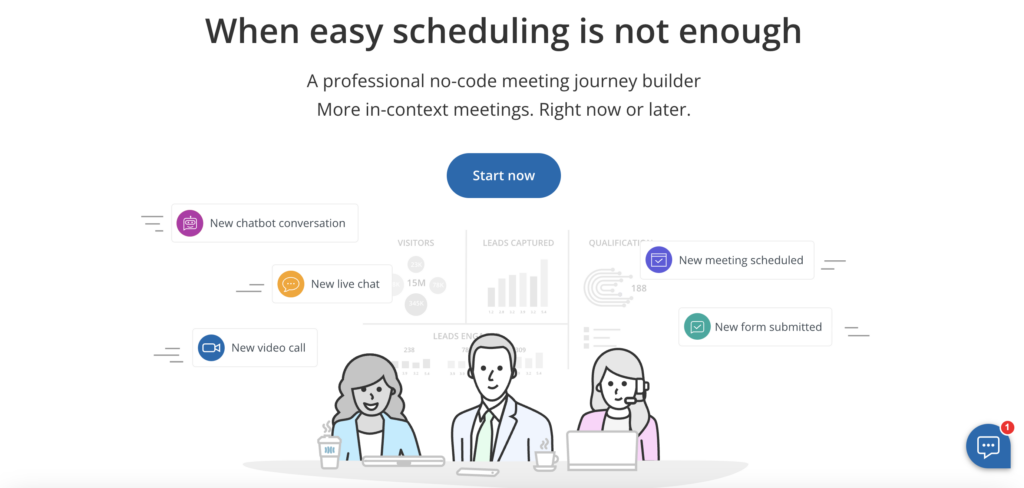
Is there something better than Calendly?
Maybe it’s OnceHub or maybe it’s something else. Let’s see below what OnceHub has to offer.
To compare OnceHub to Calendly, we must take a closer look at both first. After using OnceHub for some time, we learned that both Calendly and OnceHub are very similar in terms of features and ease of use.
So, if you were able to learn how to use Calendly, then there is no doubt that you will be able to use OnceHub as well. It is also one of the best options for individuals as well as for small businesses. It really is not easy to decide on the OnceHub vs. Calendly battle due to how similar these booking tools are.
However, the one thing that makes OnceHub different from Calendly is that it is more orientated toward sales teams and interacting with prospects and existing customers.
OnceHub is to help enhance engagement so companies can generate high-quality leads. Besides the automated scheduling process, it uses chatbots, forms, instant meetings, and live chat to facilitate communication.
This scheduling software is perfect if you wish to focus on enhancing customer journey, improving client communication, boosting customer engagement, and generating leads. On the contrary, Calendly is more adaptable and can be tailored to fit any business type and any team, which is the greatest difference between these two appointment scheduling solutions.
User ratings:
- 4.3/5 on G2
- 4.5/5 on Software Advice
- 4.6/5 on GetApp
Main features
Some of the features that help in the OnceHub vs. Calendly comparison are:
- No-code builder: Enables you to create interactive workflows effortlessly and gives your customers the possibility to connect with you and your team.
- Automated reminders and follow-ups: OnceHub allows you to automate email and SMS reminders for both you and your invitees, reducing the likelihood of missed appointments. Additionally, you can set up post-appointment follow-up emails.
- Live engagement notifications: As soon as your website visitor performs an action (subscribes or schedules an appointment), you get an instant notification, so you can track data in real time.
- Custom branding: You can personalize your booking pages, forms, and chatbots with your branding elements, creating a professional and consistent look that aligns with your business identity.
- Reporting and analytics: OnceHub provides insights into your scheduling patterns, meetings, and interactions helping you spot engagement trends and understand your funnel.
- Live engagements: Use the opportunity of real-time communication and seize the moment by engaging with your customers via video meetings and live chat.
- Group scheduling and availability sharing: You can share your availability with others, allowing them to choose suitable time slots from your schedule. This feature is particularly useful when you want to collaborate with others on finding mutually convenient times.
- Multi-person scheduling: OnceHub offers the ability to schedule appointments involving multiple participants, making it convenient for coordinating meetings or sessions that involve several people.
Ease of use
Like Calendly, OnceHub is relatively easy to use once you get into it. That is especially the case due to its intuitive and user-friendly interface. Setting up schedules and day-to-day business is pretty straightforward, and that is thanks to its clean interface.
Using this scheduling tool is very easy; in fact, anyone with little to no knowledge about these types of applications would be able to figure it out in a matter of minutes. Plus, OnceHub offers an all-around experience, so there is a huge pool of options to choose from, but worry not, it is still easy to use.
Integrations
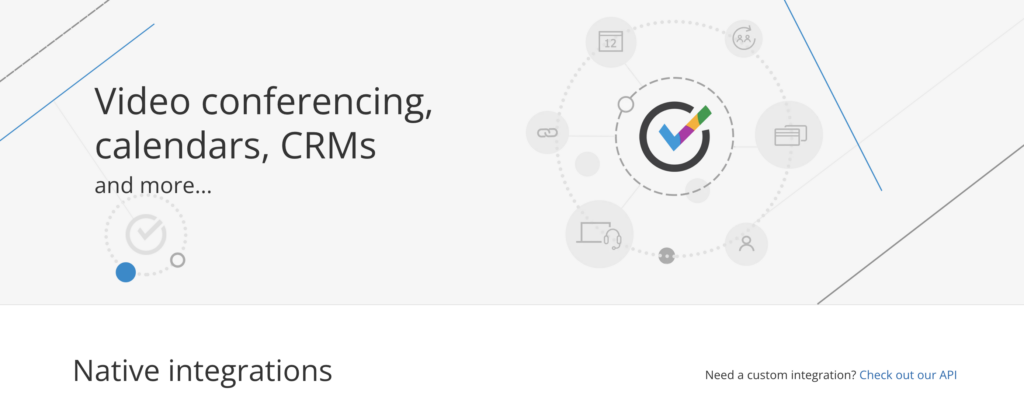
This software offers some very good integrations that can boost your business, such as Mailchimp, Zoom, Google Meet, Google Calendar, and Microsoft Teams.
Moreover, OnceHub integrates with HubSpot, Salesforce and Zapier, so your workflow can remain uninterrupted.
Customization options
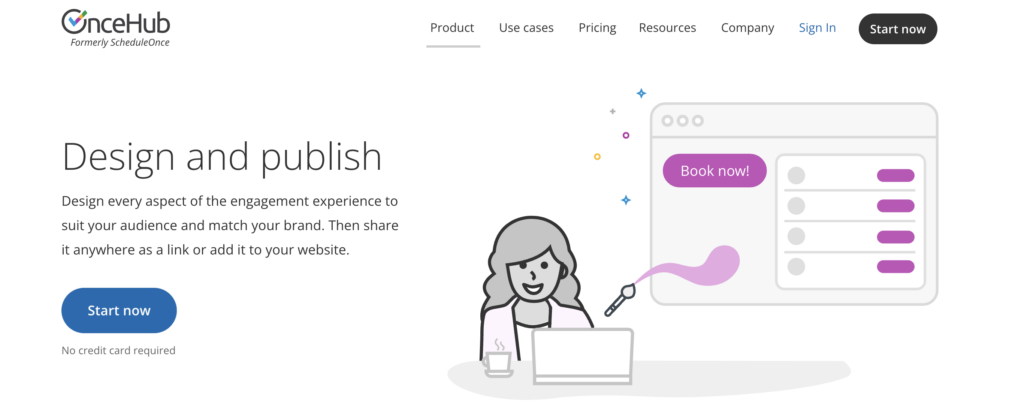
There is plenty of customization to be had with OnceHub when compared to Calendly. With OnceHub’s customization options, you can create a unique and one-time system for your clients, which can distinguish you from others.
You can customize colors, images, backgrounds, logos, and icons. Also, you can use some pretty cool pre-designed templates and themes to customize forms and chatbots.
Pricing
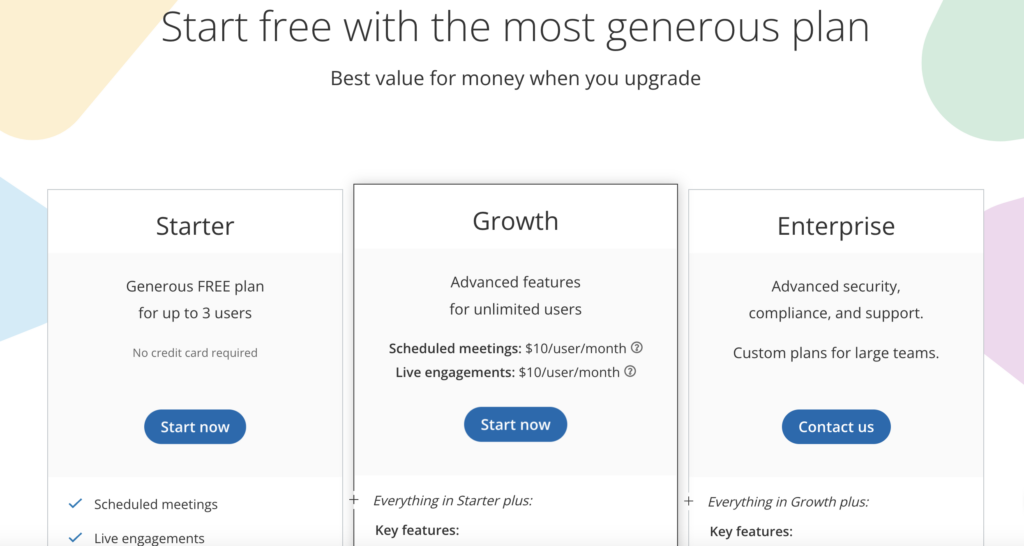
In terms of pricing, OnceHub has three pricing options: Starter, Growth, and Enterprise plans.
For individual use, Starter is more than enough. You get the calendar and video conferencing integrations, scheduled meetings, and live engagements.
Growth and Enterprise options are more suitable for larger companies because of their additional features. The Growth plan offers you unlimited users, booking pages, and history, as well as white-label branding, native CRM integrations, and 24/7 email and live chat support.
The Enterprise plan lets you include scheduling and instant meetings into your own web forms. You also get a Single Sign On (SSO), excellent security policies, and your very own success manager.
- Basic: free plan (up to 3 users);
- Growth: $10/month per user;
- Enterprise: price upon request
OnceHub vs. Calendly: The Winner?
Calendly vs. OnceHub is surely a hot debate. As they share many features and integrations, it may seem difficult to differentiate between them. However, they do have one difference: the use cases they focus on.
Calendly is a solid option if you are looking for an appointment-scheduling tool suitable for different teams and businesses. On the other hand, OnceHub is a better option for those looking to enhance the communication between their sales team and both potential and existing customers.
So, what’s the final answer? Actually, neither of these are perfect.
While at first glance, these two tools are good scheduling options, you can try other scheduling systems that are equally feature-rich and easy to use, but with a much better price-to-feature ratio.
What’s the Better Alternative To Both OnceHub and Calendly?
If you find yourself unsatisfied with the options offered by the two presented in this OnceHub vs. Calendly article, we recommend that you try Amelia, a WordPress booking plugin that allows you to easily organize bookings and reservations.
Not only does this scheduling solution include everything mentioned in this article, but because it is adapted to WordPress, it is much more intuitive and universal.
You can even have email notifications and SMS notifications so that nobody forgets about their appointment bookings.
In order to book an appointment, the complete user interaction takes a few clicks with this WordPress plugin. Moreover, with it, you can accept payments via PayPal and Stripe, perfect for those who want to pay in advance to book appointments.
As a business owner, you can monitor KPIs in the WordPress dashboard and analyze other important data to keep a pulse on your business. Amelia is a straightforward, no-nonsense booking calendar plugin and an amazing option for those who want an around-the-clock solution for their WordPress site.
Amelia also has an Events Calendar module integrated within its features.
You can now automate your event bookings as well. To be more precise, it means that you will be able to schedule single-day, multi-day, and recurring appointments with Amelia.
Did we mention that you can manage multiple locations and that you have Google Calendar integration?
All of these and much more are under only one license, no add-ons are needed.
User ratings:
- 4.9/5 on Capterra
- 4.7/5 on Trustpilot
- 4.9/5 on GetApp
So, what are you waiting for? Let Amelia handle your bookings for you – we promise you’ll see the difference.
FAQs about OnceHub vs. Calendly
1. What are the main differences between OnceHub and Calendly?
Popular online scheduling solutions like OnceHub and Calendly allow users to make appointments with clients or coworkers. Despite their similarities, there are some distinctions between these two platforms.
While Calendly is frequently seen as a more versatile appointment scheduling system, OnceHub typically offers more sales-team-oriented scheduling options, designed to enhance lead generation and customer communication.
2. Which platform offers more customization options for scheduling appointments?
OnceHub typically provides greater versatility when it comes to customization possibilities. Users can add custom fields to booking forms, brand their own booking pages, and set restrictions on when appointments can be booked. On the other side, Calendly has fewer customization possibilities but a more user-friendly, intuitive UI in general.
3. Is one platform more affordable than the other?
Both OnceHub and Calendly provide a variety of pricing options to accommodate various requirements and price ranges.
The plans offered by OnceHub tend to cost a bit less than those offered by Calendly.
4. How do the user interfaces compare between OnceHub and Calendly?
Both OnceHub and Calendly have simple, intuitive user interfaces. With a more straightforward layout and fewer features to overwhelm consumers, Calendly’s UI is frequently seen as being more user-friendly.
The UI of OnceHub can be more complicated, but this is a result of the platform’s more sophisticated functionality and customization possibilities.
5. Can both platforms integrate with popular calendar apps such as Google Calendar or Outlook?
When comparing OnceHub to Calmendly, it’s clear that the calendar programs Google Calendar, Outlook, and Apple Calendar can all be integrated with both tools. Users may sync their schedules and prevent double bookings thanks to these integrations.
6. Does one platform offer more advanced scheduling features, such as group scheduling or buffer times?
In comparison to Calendly, OnceHub offers chatbots and live chat, while Calendly has plenty of group meeting scheduling options.
7. How do the customer support options compare between OnceHub and Calendly?
Both OnceHub and Calendly provide customer service via phone, email, and live chat. Although OnceHub’s customer service is typically seen as being more thorough, both platforms provide responsive help to their users.
8. Can either platform handle complex scheduling needs, such as appointment types with varying lengths or multiple attendees?
When there are several participants or complex scheduling requirements, such as appointments with varied lengths, OnceHub is typically a preferable choice. Calendly has fewer scheduling choices but is still an excellent solution for straightforward scheduling requirements.
9. Are there any limitations to the number of appointments or users that can be managed on each platform?
There are no restrictions on the number of appointments that can be managed because both OnceHub and Calendly provide services with unlimited bookings. The maximum number of users that can be added to an account varies between plans.
10. How do the security and privacy features compare between OnceHub and Calendly?
With features like SSL encryption, data backups, and user permissions, OnceHub and Calendly both take security and privacy seriously. OnceHub, on the other hand, is regarded as providing more solid security measures, such as GDPR compliance and two-factor authentication.
If you liked this OnceHub vs. Calendly article and wish to see how Calendly performs when compared with some other booking tools and discover more Calendly-related content, check out these articles:
- Calendly vs Acuity
- Calendly vs Doodle
- Calendly alternatives
- Calendly vs YouCanBook.Me
- How to Embed Calendly in WordPress Without a Plugin
- Looking for a Calendly Affiliate Program?

